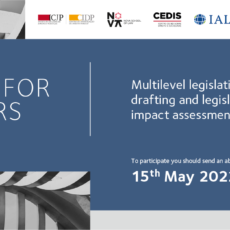
Sophisticated technological applications that use rules-based standards and semantic resources allow for the monitoring of the creation and development of legal texts in real time, thus promoting the transparency of public administration decisions and reducing administrative costs. In this innovative environment, therefore, law-making can evolve aided by modern digital tools and services.
These exciting advancements are presented in a highly interesting publication titled Law-making Process and Legal Informatics that just came out by IAL member Dr. Fotios Fitsilis, Head of Department for Scientific Documentation and Supervision at the Scientific Service of the Hellenic Parliament, and Georgia Makropoulou, Attorney at Law, Special Scientific Associate to the Scientific Council of the Hellenic Parliament. The foreword is written by IAL President Prof. Dr. Helen Xanthaki.
The book:
- describes the evolution of the law-making ‘art’ into a modern science;
- presents the stages of law-making and the actors involved, focusing mainly on the Greek example;
- analyses the nature and capabilities of legal informatics tools;
- outlines the typical application of legal informatics systems in a public administration environment;
- suggests the adoption of standards and the development of appropriate ontologies;
- examines the introduction of disruptive technologies, such as artificial intelligence.
This pioneering publishing project in Greek by Nomiki Bibliothiki thoroughly analyses the legal theoretical background of the law-making process, while offering realistic proposals for its technological facilitation. The book is offered as a valuable aid for government officials who are actively involved in law-making, as well as computer scientists, lawyers and researchers interested in the application of new techniques aimed at improving the quality of law-making. It is also appropriate for students of public administration reform or political science, who wish to study modern regulatory processes.
Book web page: https://www.nb.org/nomoparaskeyastiki-diadikasia-kai-nomiki-pliroforiki.html





